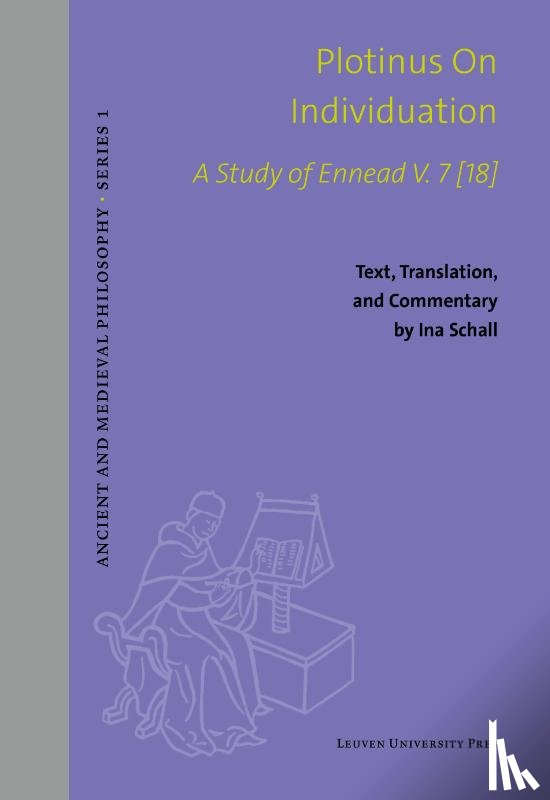Omschrijving
New translation and first running commentary in English of Plotinus’s V. 7 [18]. No other Neoplatonic text has sparked as much debate as Ennead V. 7 [18] of Plotinus, ‘On the question of whether there are also Forms of individuals’. In this text, Plotinus is believed to postulate the existence of Forms of individuals alongside the traditional Platonic Forms of genera and species. If so, Plotinus stands as the sole figure in Platonism to advocate this problematic theory. Regrettably, most research on V. 7 [18] has focused solely on the Forms of individuals, overlooking other interesting aspects. This book demonstrates how Plotinus reconciles transmigration and biological heredity within his metaphysics of individuality, addressing a longstanding challenge for ancient philosophers from Pythagoras on. Plotinus' theory of individuation represents a significant innovation in ancient thought. Plotinus on Individuation offers a comprehensive assessment of V. 7 [18], providing a new translation and the first running commentary in English.Filling an important void, this book enriches the scholarship on Plotinus and contributes considerably to the growing interest in Plotinus’ natural philosophy and the natural philosophies of the Neoplatonists in general.Ina Schall obtained her PhD in Ancient Philosophy through an international cotutelle program between the University of Cologne and the Catholic University of America. No other Neoplatonic treatise has sparked as much debate as Ennead V. 7 [18] of Plotinus, ‘On the question of whether there are also Forms of individuals’. In this treatise, Plotinus is believed to postulate the existence of Forms of individuals alongside the traditional Platonic Forms of genera and species. If so, Plotinus stands as the sole figure in Platonism to advocate this problematic theory. Regrettably, most research on V. 7 [18] has focused solely on the Forms of individuals, overlooking other interesting aspects. This book demonstrates how Plotinus reconciles transmigration and biological heredity within his metaphysics of individuality, addressing a longstanding challenge for ancient philosophers from Pythagoras on. Plotinus’s theory of individuation represents a significant innovation in ancient thought. Plotinus On Individuation offers a comprehensive assessment of V. 7 [18], providing a new translation and the first running commentary in English.
Filling an important void, this book enriches the scholarship on Plotinus and contributes considerably to the growing interest in Plotinus’s natural philosophy and the natural philosophies of the Neoplatonists in general. Acknowledgements
Part I. Introducti on: Structure, content, and controversies of V. 7 [18]
Individuation, embryology, and transmigration in Plotinus
Clarification of key terms
a) Individual/individuals (kathekaston/kathekasta)
b) Forming principles (logos/logoi)
The style of V. 7 [18] and its place within the Enneads
a) Difficulties in writing style and argument
b) V. 7 [18] and the Fifth Ennead
c) V. 7 [18] and the chronological order of Plotinus’ treatises
Structure and fundamental topics in V. 7 [18]
a) Plotinus’ theory of individuals and logoi
b) Logoi in the doctrine of transmigration
c) Plotinus’ embryology
d) Stoic influence in V. 7 [18]
Forms of individuals in Plotinus? A lengthy debate
5.1 Three readings of V. 7 [18]
5.2 First reading: V. 7 [18] is about Forms of sensible individuals
a) Heinemann, Trouillard, Harder, Rist
b) Blumenthal, Mamo, Rist
c) Struggling with the doctrine of transmigration
d) Graeser, O’Meara, Petit, Stern-Gillet, Sikkema
5.3 Second reading: V. 7 [18] is about Forms of intelligible individuals (Form-Intellects and soul-Forms)
a) Armstrong, Gerson
b) Kalligas, Ferrari, Tornau
5.4 Third reading: V. 7 [18] is about logoi of sensible individuals
a) Vassilopoulou, Remes, Aubry, Wilberding
5.5 Summary of the scholarly debate
Part II. S ynopsis, Greek Text, and Translati on
Synopsis
Greek text of V. 7 [18]
a) Consulted editions, translations, and commentaries
b) Dictionaries
c) Remarks on Plotinus’ works and style
Ennead V. 7 [18]
English translation
Part III. Commentary
V. 7 [18] 1: Principles of individuals – Forms or logoi?
V. 7 [18] 2: Embryology – How are logoi passed on from parents to offspring?
V. 7 [18] 3 : Do seemingly identical individuals actualise the same logoi-combination?
Bibliography
Editions and Translations
Secondary Literature
Index Locorum
Index of Names and Subjects


